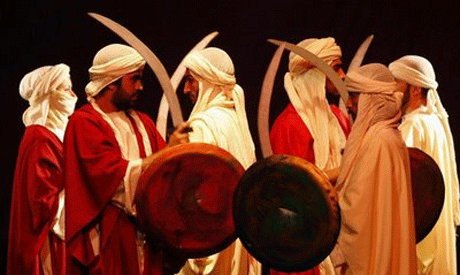
Iranian Artists performing Ashoura Day rituals
source: Reuters
Some wheat grain, corn flour, butter, sugar and two cups of milk is all Samira Hussein needs for a happy Ashura day. For over 750,000 Shiites living in Egypt, Ashura is a traditional dish with a long history.
Today, the 10th day of Muharram in the Islamic lunar calendar, Egyptians are busy distributing sweet dishes of Ashura to neighbours and relatives, after a long day of fasting.
'It's a very nice occasion to visit relatives, socialise with the neighbours and fast for the reward of having the previous year’s sins forgiven,' says Amina, a 46-year-old housewife and mother of three teenagers. 'We cook a delicious Iftar (meal to break the fast) and invite friends and family members for a Ashura dish, so it's a social and religious occasion'
But before being ‘Egyptianised’ by the Muslim Sunni majority in Egypt, Ashura was more than a socially-celebrated dish.
According to the legend the sweet dish with white kidney beans, came from the prophet Noah. When the waters of the great flood began to recede, Noah and his family are said to have gathered up all the food remaining on the ark and transformed it into a delicious pudding.
Co-existence, rejuvenation, solidarity and most importantly linking one’s own sufferings to the sacrifice of others is what the day implies for many who are inspired by the festival, especially Shiites.
"Ashura is a symbol of endurance against oppression. Such a stand should fill our hearts and minds each time we face the oppressors and arrogant powers,' said one member of the small Shiite minority in Cairo, who wished to remain anonymous. "I can't accept some practices by Shiites in other Arab countries, who commemorate this feast by hurting their body with swords and knives. This is violence and Imam Hussein always stood against violence and said 'I did not rise for rebellion, but for reforming the Ummah (the nation) of my grandfather, Prophet Mohammad.
Every year thousands of Shiites pilgrims in the city of Kerbela in Iraq celebrate Ashura by striking their heads with swords and flagellating themselves to show their grief.
According to Tafseer Ibn Kather, the Prophet Muhammad asked Muslims to fast at Ashura, to commemorate Noah’s ark saying "I ask God that fasting on the day of Ashura may atone for the sins of the preceding year."
About sixty years later, on the 10th of Muharram AH 61 (10 October 680 CE), the Caliph Yazid of Damascus consolidated his authority with the murder of Hussein, grandson of the Prophet and the third Imam, together with his infant son, eighteen men of his family and fifty-four male companions. Their wives and children were also captured in one of the bloodiest battles in the history of Islam, known as the battle of Kerbala.
Historians have described the scene of Hussein's death as horrifying when his head was mounted on a spear and paraded through the villages and towns, then taken to Damascus and presented at the feet of Yazid.
Shiites all over the world remember this day with dramatic, emotional mourning rituals known as taziye.
The life and death of Imam Hussein was inspiring to one of the world's most influential leaders. "I learnt from Hussein how to achieve victory while being oppressed." said Mahatma Ghandi.
"The victory of Hussein, despite his minority amazes me!" Scottish historian Thomas Carlyle once said, while Charles Dickens was quoted as saying "If Hussein had fought to quench his worldly desires…then I do not understand why his sister, wife and children accompanied him. It stands to reason therefore, that his sacrifice was purely for Islam.",
Short link: